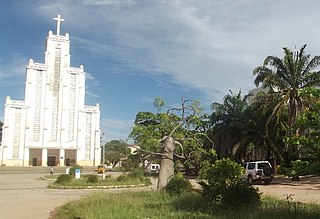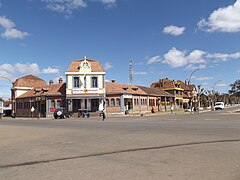
Madagascar, officially the Republic of Madagascar, is an island country comprising the island of Madagascar and numerous smaller peripheral islands. Lying off the southeastern coast of Africa, it is the world's fourth largest island, the second-largest island country and the 46th largest country in the world. Its capital and largest city is Antananarivo.

The History of Madagascar started from the ancient supercontinent of Pangaea, containing amongst others the African continent and the Indian subcontinent, and by the island's late colonization by human settlers from the Sunda Islands and from East Africa. These two factors facilitated the evolution and survival of thousands of endemic plant and animal species, some of which have gone extinct or are currently threatened with extinction. Trade in the Indian Ocean at the time of first colonization of Madagascar was dominated by Indonesian ships, probably of Borobudur ship and K'un-lun po types.

Demographic features of the population of Madagascar include population density, ethnicity, education level, health of the populace, economic status, religious affiliations and other aspects of the population.

The economy of Madagascar is US$9.769 billion by gross domestic product as of 2020, being a market economy and is supported by an agricultural industry and emerging tourism, textile and mining industries. Malagasy agriculture produces tropical staple crops such as rice and cassava, as well as cash crops such as vanilla and coffee.

Antananarivo, also known by its colonial shorthand form Tana, is the capital and largest city of Madagascar. The administrative area of the city, known as Antananarivo-Renivohitra, is the capital of Analamanga region. The city sits at 1,280 m (4,199 ft) above sea level in the center of the island, making it the highest national capital by elevation among the island countries. It has been the country's largest population center since at least the 18th century. The presidency, National Assembly, Senate, and Supreme Court are located there, as are 21 diplomatic missions and the headquarters of many national and international businesses and NGOs. It has more universities, nightclubs, art venues, and medical services than any city on the island. Several national and local sports teams, including the championship-winning national rugby team, the Makis, are based here.

Mahajanga is a city and an administrative district on the northwest coast of Madagascar. The city of Mahajanga is the capital of the Boeny Region. The district had a population of 258,068 in 2020.

The Merina people formerly called Amboalambo are the largest ethnic group in Madagascar. They are the "highlander" Malagasy ethnic group of the African island and one of the country's eighteen official ethnic groups. Their origins are mixed, predominantly with Austronesians arriving before the 6th century AD with Bantu Africans resulting in a core population known as Vazimba, later by large number of Javanese and a minority of Arabs, Indians and Europeans. They speak the Merina dialect of the official Malagasy language of Madagascar.

The Malagasy are a group of Austronesian-speaking ethnic groups indigenous to the island country of Madagascar, formed through generations of interaction between Austronesians originally from southern Borneo and Bantus from Southeast Africa. Traditionally, the population have been divided into sub-ethnic groups. Examples include "Highlander" groups such as the Merina and Betsileo of the central highlands around Antananarivo, Alaotra (Ambatondrazaka) and Fianarantsoa, and the "coastal dwellers" such as the Sakalava, Bara, Vezo, Betsimisaraka, Mahafaly, etc.

Islam in Madagascar is a minority religion, with most Malagasy people adhering to Christianity. Due to the secular nature of Madagascar's constitution, Muslims are free to proselytize and build places of worship in the country.

The Malagasy Republic was a state situated in Southeast Africa on the island of Madagascar. It was established in 1958 as an autonomous republic within the newly created French Community, became fully independent in 1960, and existed until the proclamation of the Democratic Republic of Madagascar in 1975.

The culture of Madagascar reflects the origins of the Malagasy people in Southeast Asia, East Africa and Oceania. The influence of Arabs, Indians, British, French and Chinese settlers is also evident.
Chinese people in Madagascar are a minority ethnic group of Madagascar and form Africa's third largest overseas Chinese population with a population estimated at between 70,000 and 100,000 in 2011. They are divided between local Chinese population called "Sinoa zanatany" who arrived during the french colonization, speaking mostly malagasy dialects, located in eastern and southeastern part of Madagascar and post-colonial chinese migrants speaking mostly Mandarin who live mainly in the capital Antananarivo.

Andry Nirina Rajoelina is a Malagasy-French politician and businessman who has served as president of Madagascar since 2019. He was previously president of a provisional government from 2009 to 2014 following a political crisis and military-backed coup, having held the office of Mayor of Antananarivo for one year prior. Before entering the political arena, Rajoelina was involved in the private sector, including a printing and advertising company called Injet in 1999 and the Viva radio and television networks in 2007.

The Malagasy language, of Austronesian origin, is generally spoken throughout the island. The official languages of Madagascar are Malagasy and French. As a member of the Organisation internationale de la Francophonie, Madagascar is a Francophone country, and in 2024, French is spoken by around a quarter of the population in Madagascar, i.e. 8,5 million people out of 32 million (26.59%).
Prostitution in Madagascar is legal, and common, especially in tourist areas. Related activities such as soliciting, procuring, living off the earnings of prostitution or keeping a brothel are prohibited. Public Order laws are also used against prostitutes. There are recent laws against "consorting with female prostitutes". People caught paying for sex with children under 14 can face criminal penalties of up to 10 years imprisonment. This is strictly enforced against foreign tourists. As well as in the tourist areas, prostitution also occurs around the mining towns of the interior such as Ilakaka and Andilamena. It was estimated that there were 167,443 sex workers in the country in 2014.

The Colony of Madagascar and Dependencies was a French colony off the coast of Southeast Africa between 1897 and 1958 in what is now Madagascar. The colony was formerly a protectorate of France known as Malagasy Protectorate. The protectorate became a colony, following Queen Ranavalona III's exile to Réunion.
The Ambatovy mine is a large open cut lateritic nickel-cobalt mine located in Madagascar, off the east coast of Africa. The largest mine in the country, it is a major contributor to the economy of Madagascar.
Aquaculture in Madagascar started to take off in the 1980s. The industry includes the cultivation of sea cucumbers, seaweed, fish and shrimp and is being used to stimulate the country's economy, increase the wages of fishermen and women, and improve the regions ocean water quality. Coastal regions of Madagascar are reliant on the Indian Ocean's marine resources as a source of food, income, and cultural identity.

The mining industry of Madagascar is mostly on a small scale, centred mainly around remote locations with large mineral deposits. Mining potential is noted in industrial and metallic minerals, energy, precious and semi-precious stones, as well as ornamental stone. The mining sector was neglected by the government for decades prior to the mid-2000s. In 2013, the mining industry, a main source of foreign investment, was struggling due to "low metals prices and distrustful companies", attributed to a 2009 coup.

Madagascar–South Africa relations refers to the diplomatic relations between Madagascar and South Africa. Both nations are members of the African Union, Group of 77, Non-Aligned Movement and the Southern African Development Community.


















